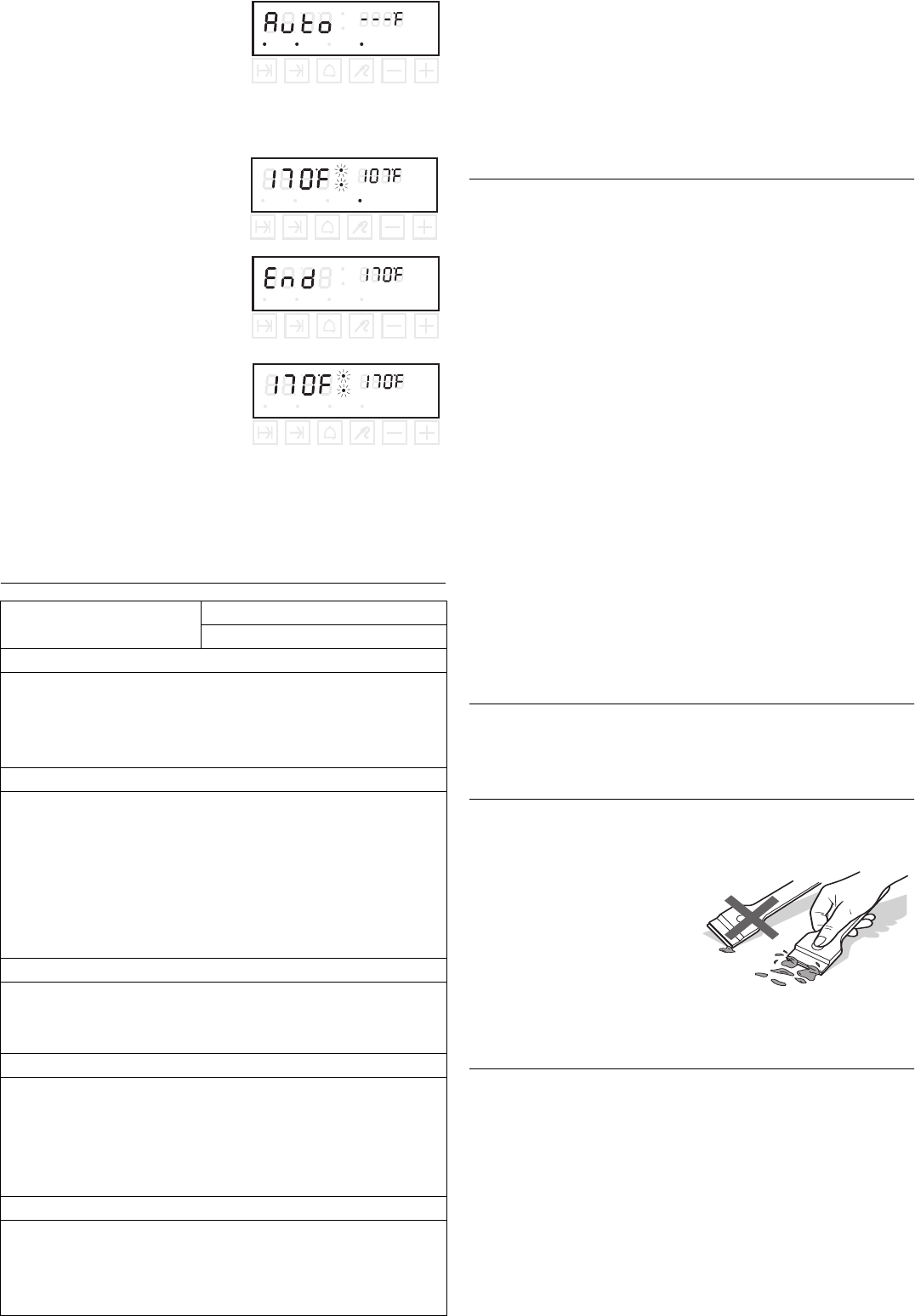
14 EEB 9600.0 USA
After approx. 3 seconds, the timer will
start and the lights will stay on continuous-
ly. The display will show “Auto” until the
oven switches on. The right display shows
you the current core temperature inside
the roast.
– Set the temperature and mode.
– The oven automatically switches on at
the beginning of the cooking time.
Both lights will flash alternately.
When the actual core temperature
reaches the value you have set, the oven
will switch itself off and “End” will
appear in the display. A warning signal
will sound. Both lights will stop flashing.
– Press any button to stop the alarm
buzzer.
Both lights will flash alternately in the
display as long as the roasting
thermometer is inserted.
– Turn the temperature control and the mode selector switch to “0”.
– Remove the roasting thermometer from the socket. The display will show the
normal clock again.
Recommended core temperatures
Cleaning and care
Carefully read this chapter before you use your appliance for the first time.
With correct cleaning and regular maintenance, the appliance will remain
beautiful and clean for many years. These tips will help you maintain and keep
the individual surfaces clean.
For all surfaces
[
Don’t use steam and/or pressure cleaning machines to clean the
appliance! This can damage the unit and risk personal injury.
[
Risk of burning! Make sure the appliance has cooled down before
cleaning.
[
Please pay attention to the cleanser’s instructions.
Clean the appliance after each use. Dirt that hasn’t been removed will burn
into the surface the next time the oven is turned on, making it virtually
impossible to remove these incrustations..
Use a damp cloth or a soft sponge with a mixture of warm water and mild
detergent to clean surface dirt. Use cold water to wipe off the surface
completely and to remove residues from cleansers which can cause
discoloration and stains. Wipe dry.
F
To remove heavy dirt and clean individual parts and surfaces, read on. .
Don’t use:
- aggressive or bleaching cleansers with active oxygen, chlorine or corrosive
components.
- abrasive or aggressive cleansers or scouring agents like steel wool, soap-
filled steel wool, metal or plastic sponges or similar items with an abrasive
surface.
Remove caking
Soak heavy dirt with a wet cloth, to make it easier to clean.
Using a cleaning scraper
[
Caution! The blade of the cleaning scraper is very sharp. Be careful when
using!
Always keep the cleaning scraper flat
on the surface and push the caked-
on debris away from you.
[
Don’t scratch the surface with
the edge of the scraper or
damage the sealing with the
scraper’s edge.
Information about oven sprays
[
Please follow the manufacturer’s instructions. Oven sprays damage
aluminium, lacquered surfaces and plastic!
[
Don’t spray into the opening of the ventilator at the backplate!
For environmental reasons, we do not recommend the use of oven sprays. If
you do use one, only use it in the oven interior and on enamel baking trays.
Dish Core temperature
in °F in °C
Beef
Roast beef/Fillet of beef, rare 105-115 40-45
Roast beef/Fillet of beef, medium 120-130 50-55
Roast beef/Fillet of beef, well done 140-150 60-65
Joint of beef 175-185 80-85
Pork
Loin of pork 150-160 65-70
Roast pork/ham 175-185 80-85
Neck, knuckle of pork 175-185 80-85
Chop, saddle 165-175 75-80
Chop without the bone 160 70
Smoked loin of pork 150-160 65-70
Meat loaf 160-165 70-75
Veal
Roast veal 160-165 70-75
Roast veal stuffed with kidneys 165-175 75-80
Knuckle of veal 175-185 80-85
Game
Meat of game 165-175 75-80
Saddle 140-160 60-70
Fillet of game, rare 105-115 40-45
Fillet of game, medium 120-130 50-55
Fillet of game, well done 140-150 60-65
Lamb 175-185 80-85
Stuffed joint 160-165 70-75
Poultry 185-195 85-90
Fish 160-175 70-80


















